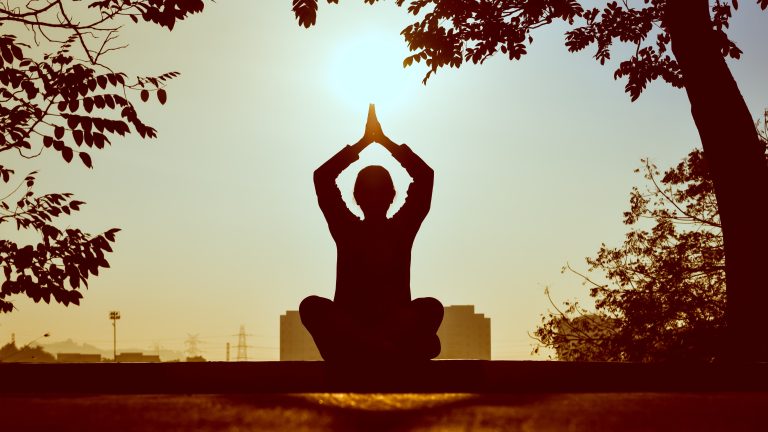Mindfulness and meditation are two words that are being used interchangeably today, and it’s easy to misunderstand the meaning of both. While they are closely related, there are some nuanced differences that once understood will help unlock the transformative potential of mindfulness vs meditation. Today, we want to take a closer look at both these concepts, understand the meaning and purpose of each, and break down the difference between them.
Download the app today!
Let’s dive in! Before we understand the differences, let’s see in detail what these concepts are all about.
Unpacking Meditation
It’s common knowledge that meditation is a tool for relaxation and mindfulness, but there are some fun, lesser-known facets that are waiting to be explored. Let’s take a look-
1. The Power of Loving-Kindness Meditation:
This meditation practice involves positive and kind self talk towards oneself and others. Scientific studies suggest that regular loving-kindness meditation can enhance feelings of compassion, empathy, and overall well-being.
2. Meditation’s Influence on Brain Plasticity:
Research indicates that consistent meditation can lead to structural changes in the brain, specifically in regions associated with memory, self-awareness, and emotional regulation.
3. The Role of Sound in Meditation Practices:
Yes, you heard the right. Sound is a powerful tool of meditation too! From chanting mantras to incorporating singing bowls or nature sounds, the intentional use of sound-based practices can deepen focus, enhance relaxation, and create a unique sensory experience.
4. Accessing Altered States of Consciousness:
Certain techniques, such as transcendental meditation or focused breathwork, can induce profound shifts in awareness if practised over time. This leads to heightened creativity, intuition, and expanded perception.
5. Meditation’s Impact on Ageing:
Believe it or not, meditation can slow down the ageing process! Studies suggest that regular meditation may contribute to the preservation of telomeres, the protective caps on the ends of chromosomes associated with ageing.
6. Integrating Movement into Meditation:
Meditation need not always be about stillness. Practices like walking meditation or yoga combine physical activity with meditative awareness. This integration allows individuals to experience the benefits of meditation while engaging the body and being mindful of every movement.

Meet your Happiness Goals on Happily
Our Relevant Products
Feel Calm
Feel Motivated
Mindful Relationships
Personal Growth
Brtter Sleep
Slowing Down
and many more...
Unpacking Mindfulness
Mindfulness requires individuals to be hyper aware of their surroundings, interactions and emotions. It is a way of life, and there are some interesting aspects that may surprise even seasoned practitioners. Let’s take a look at some of these-
- Mindfulness and Pain Perception
Studies indicate that mindfulness meditation can effectively reduce the perceived intensity of pain and the emotional distress associated with it. The practice encourages a non-reactive awareness that transforms the relationship individuals have with their pain, and can do wonders for pain management.
- Mindfulness and Emotional Regulation
By encouraging non-judgmental awareness of emotions as they arise, mindfulness allows individuals to respond to challenging feelings with greater clarity and composure. Over time, this helps in regulating emotions especially during stressful times.
- Mindfulness and Creativity
Mindfulness creates a fertile ground for creative insights to flourish. Artists, writers, and innovators are increasingly turning to mindfulness to feel more inspired by life around them, and reflect on thoughts that they would otherwise have pushed aside.
- Mindfulness and Compassion
Loving-kindness meditation, a form of mindfulness practice, directs positive self-talk, and promotes empathy, kindness, and a sense of interconnectedness with all living beings.
- Mindfulness and Cognitive Flexibility
Mindfulness helps shift perspective, and offers practitioners s a mental agility that proves invaluable in navigating life’s challenges and embracing diverse viewpoints.
- Mindfulness and Work
As workplaces embrace wellness initiatives, mindfulness is emerging as a cornerstone of employee well-being. Beyond stress reduction, mindfulness in the workplace has been shown to enhance focus, boost creativity, and improve interpersonal relationships. It’s turning out to be an effective tool in stress management!
Download the app today!
Now that we’ve broadly understood what these concepts stand for, let’s take a closer look at the differences between them.
Mindfulness vs Meditation
The practice of each
Meditation is a focussed and intentional practice that takes place in the form of an activity. It requires the person to sit down with complete attention in a space with minimal distractions, and pay attention to a specific object, or activity like chanting. The idea behind this is to build focus that helps quieten the mind, and cultivates a state of inner calm and heightened awareness.
Mindfulness on the other hand is a broader concept that encompasses a state of awareness in the present moment. It involves paying attention to the current experience without judgement, whether in daily activities, interactions, or even during the practice of formal meditation.
The execution of each
Meditation requires a formal setting, an intentional activity that requires you to set aside time. It can take place in a formal setting, and you can choose to sit down, lie or even engage in specific movements. Meditation can also be guided by a teacher, or can be self-directed.
Mindfulness can be cultivated through both formal and informal practices. You can be mindful when you’re intentionally setting aside time for meditation, or you can be going about your daily tasks and be present while doing all of them- mindfulness is an ongoing practice that is applicable to all aspects of life and does not require a person to set aside time. This integration into various aspects of life distinguishes mindfulness from the more structured nature of meditation.
The techniques of each
There are various meditation techniques, and some popular examples include mindfulness meditation, sleep-meditation, loving-kindness meditation, transcendental meditation, and body scan meditation.
Since mindfulness is an on-going process, it is applicable to all the moments of life, and can include mindful eating, communication, walking and other routine activities.
The purpose of each
While meditation is a tool for deep inner exploration and self-discovery, mindfulness emphasises non-judgmental observation in day to day life. Meditation allow individuals to sit with their thoughts, and deeply analyse the emotions and sensations. Mindfulness propagates the idea of calmness- Instead of reacting impulsively to thoughts or emotions, mindfulness asks individuals to cultivate an attitude of curiosity and acceptance toward their experiences.
How are mindfulness and meditation similar to each other?
While the two concepts are starkly different, they are interrelated to each other too. Mindfulness and meditation are interconnected practices. Meditation techniques, such as mindfulness meditation primarily contribute to cultivating overall mindfulness. Mindfulness, in turn, enriches the depth of meditation by fostering present-moment awareness.
Both also share a common goal. They both believe in achieving mental clarity, emotional balance and a deeper understanding of oneself. They are both tools for achieving a state of inner peace and well-being.
To sum it up, meditation is a specific, intentional practice that involves blocking out time in a formal setting, and paying attention to the thoughts and emotions that run through your mind. Mindfulness, on the other hand, is a broader state of present-moment awareness that extends into all aspects of life, including but not limited to formal meditation sessions. Together, they enable a life where it gets easier to regulate emotions and enjoy mental clarity.






